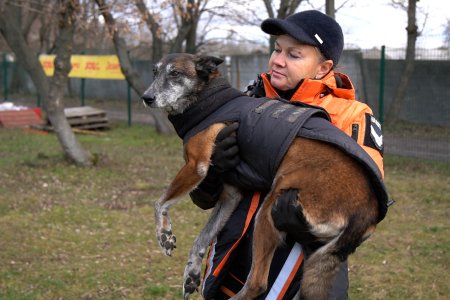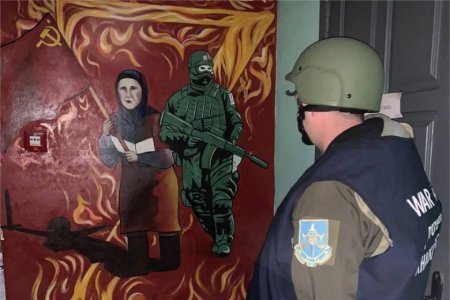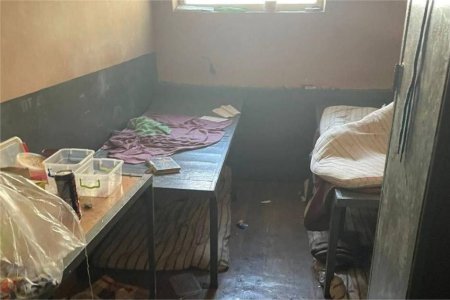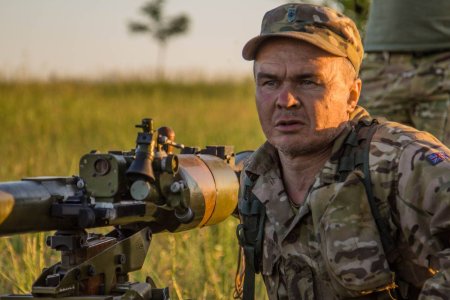My name is Olha Bondar-Reznichenko. My field is literature, history, and literary criticism of modern fiction. I have been working at the Kharkiv Literary Museum since the very beginning of its existence. Now, my position is that of a leading specialist. In the St. Dmitrievskaia church, I have been a titar (church headman) for many years. Since 2014, we have been volunteering at the St. Dmitriev Catechetical and Pastoral Center.
To make it functional for civil structures, we established ourselves as “Dobrochynets” LLC, and we have maintained this status since July 2022. In general, our usual volunteer work began in March 2014, when we came from the Maidan and were one of the organizers of the February march. Then we returned from the Kyiv Maidan and started working here, in Kharkiv. And actually, since March, after the annexation of Crimea, we started going to the 92nd brigade, to the village of Veseloye. And from there, together with this brigade, we advanced further to the Luhansk region, to the city of Schastia. Since then, we worked almost every week, and later every month, along the entire front line.
The return of Ukrainian books to the de-occupied part of the Kharkiv region
We arrived in Korobchino of the Chuhuiv district — it was around May 2022. There was constant shelling then. We came there to help people — not only did we bring ready-made products, but also our doctor, Elena Doroga, who, at the beginning of the full-scale invasion, organized medical assistance in the Kharkiv subway, traveled with us, and bandaged people’s hands and feet. At that time, there were a lot of burns, mainly because people were cooking outside.
When we came there again, the women said: “We sit in basements all the time, but between the shelling and in the daylight (there was no electricity there), I would like to read something about love.” And then she added: “Here, my Petrik has already learned ‘Kotygoroshka’ by heart, he will soon go to the first grade, he would like to read more books.” Zhadan allocated money for books — love novels, detective stories for adults, and children’s books — and we brought them to Korobchyno in a couple of weeks.

Once, we traveled with a very famous French public figure, a philosopher. He was utterly stunned by the fact that people did not rush to the food, but instead rushed to the books that we had laid out on the table and immediately took everything. You should have seen the happy face of that Petrik!
When we went to the de-occupied villages, we saw that the books had been burned there. In Malyi Burluk, for example, Russians first burned Ukrainian classics, then modern books, and there were still mountains of books ready to be burned. In these piles, we found works by modern Ukrainian writers and books from historical series.
As a result, our project began with the return of books to the de-occupied villages of the Donetsk and Kharkiv regions. Ukrainian publishers — Staryi Lev, Ababagalamaga, Vyvat, Shkola, Ranok, and many others — responded. Libraries in the Rivne region, as well as children’s schools from Transcarpathia and Ivano-Frankivsk, also joined. They all sent a lot of books. We barely managed to deliver them to the libraries of the de-occupied villages. In 2023, we collaborated on another project with “Book Forum”, delivering not only books but also board games and bookshelves.
But I emphasize to everyone that today it is essential to deliver books not only to the territory where libraries have been bombed twice or thrice, but also to help those areas where there are now a lot of refugees from the same villages that the Orcs [Ukrainian name for Russian military] are now attacking. It helps to conduct classes with children in a more meaningful way. It is necessary to work with evacuated children. There are not enough modern Ukrainian books in either the Bohodukhovskyi or the Valkovskyi districts, compared to those villages that the enemy once again bombed on the de-occupied territory.

In the summer of 2023, the occupiers bombed the libraries in Borova, Pryshyb, and the villages around Borova, literally a week after we brought the books. Shelters are usually located where there is a school, kindergarten, or Point of Invincibility. And it is precisely at such points that Orcs shoot first of all. I was very sorry that the libraries to which we brought the books were destroyed in Borova two weeks later.
The word is a weapon. Do people need Russian classics?
We have a principled position. Even when, in 2022, some publishing houses handed over to us scrapped Russian literature — excellent books — we immediately sent them to the waste. The word is definitely a weapon. This is a spiritual weapon. And the Orcs pay attention to this. We looked at their magazines, which they had left behind. They planned many events: in May and June 2022, talks about victories in the Great Patriotic War were held (or at least planned). There was something about the Battle of Kursk. About how strong our “United Nations” was at that time.
Even on March 8, they were already holding something there. That is, their ideological work began already on the second day after they entered these villages and began to establish their own order. We knew that in territories where there is no television or the Internet, people must read and develop their intellectual abilities. And the most important thing for us is that it happens using the Ukrainian language.
This is especially important for children. In many villages, they were unable to attend school due to the coronavirus and later, the war. They didn’t go to first grade for four years, and it was vital for us that they start learning with Ukrainian books, especially for those villages that are largely Russified. However, our village population mainly speaks Surzhyk [a mixture of Ukrainian and Russian, not a formal dialect with established rules]. However, it is clear that a communist Soviet upbringing has left its mark. It was significant for us that the children had at least some alternative information, because we sometimes found ourselves in curious situations.

Together with the students of UKU and young coaches, we established mobile schools in 2022-2023. It was a grant project: our teachers and students came and lived among the children for 10-15 days. They conducted classes on critical thinking, effective discussion, resisting bullying, and being active citizens, among other topics. And for us, it was essential that the children form a stable Ukrainian stance and even influence their parents not only in terms of de-Russification, but also decommunization.
In Izyum and the surrounding villages, we prepared plays and verteps [portable puppet theatres and dramas that often present nativity scenes] together with the children. Children went from house to house, showing verteps; 90-year-old grandmothers remembered a little from their childhood, recalling what it was like for them. And it was very cool.
But once the students called me and said, “Come, look.” I look, and there is an icon of Nicholas II in the family of activists who helped us. Such things are still in the heads of our people; there is still confusion. We pay too little attention to helping our village firmly take Ukrainian positions, helping intellectually, aesthetically, and sometimes using certain propaganda. Quite often, we forget that a state begins with its own culture and identity. And we allocate the smallest budget for culture.

We understand very well that now, during the war, there are conditions for uniting and forming our country as an active and creative nation. We have no other opportunities, because “they” are numerically superior to us, and we can defeat the katsaps [derogatory ethnic slur for Russians] only thanks to our creativity and the search for some innovative solutions in everything. That is why, probably, it is so vital for us, on the one hand, to make “Mavyki [compact UAV drones ]” cooler and better than theirs, and on the other hand, to work more actively with children in villages and small towns. And there should be many such efforts today in order not to miss this moment of forming a strong, creative national identity.



